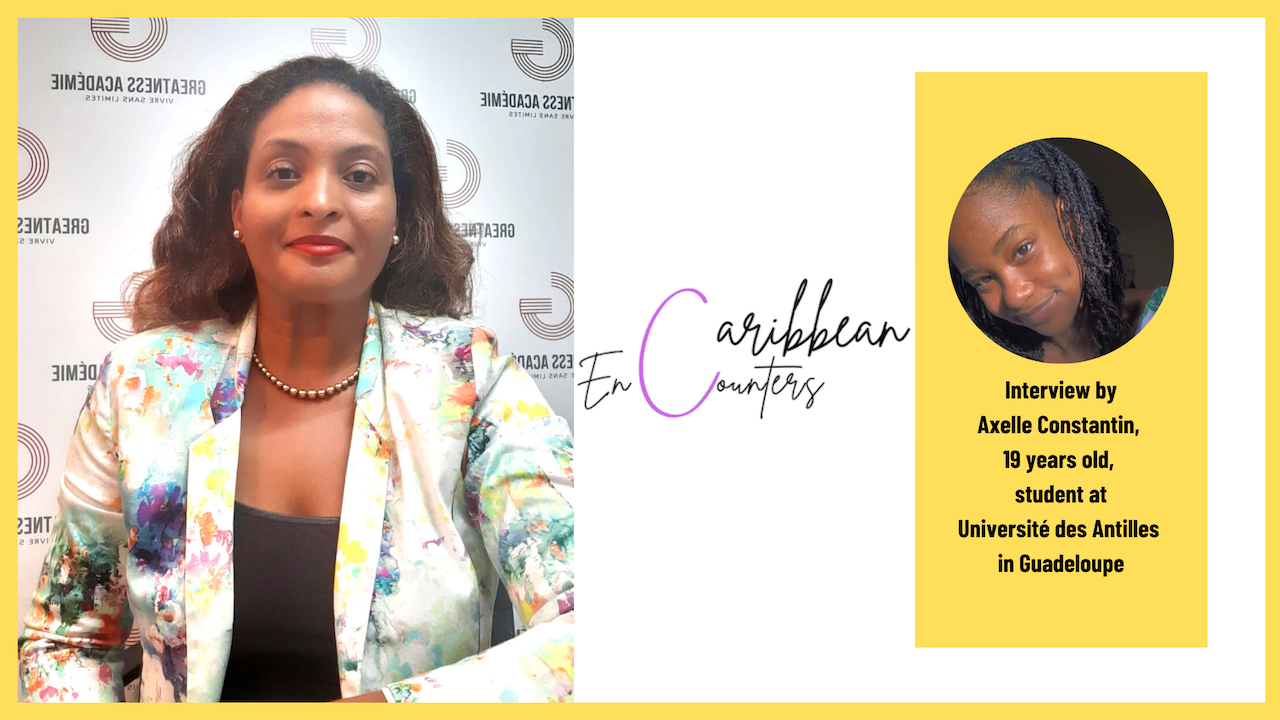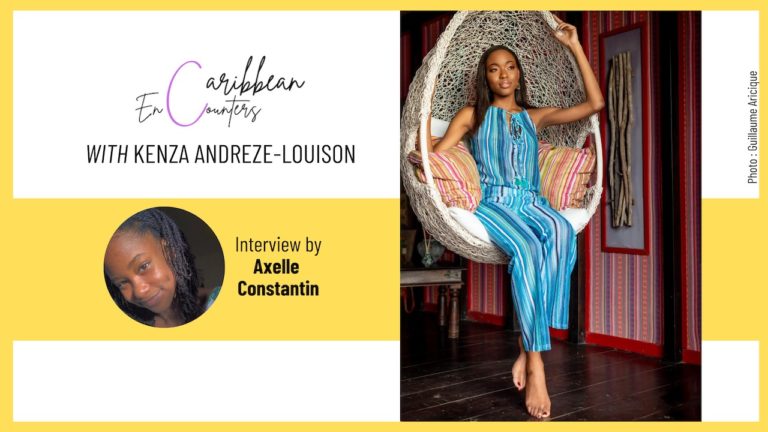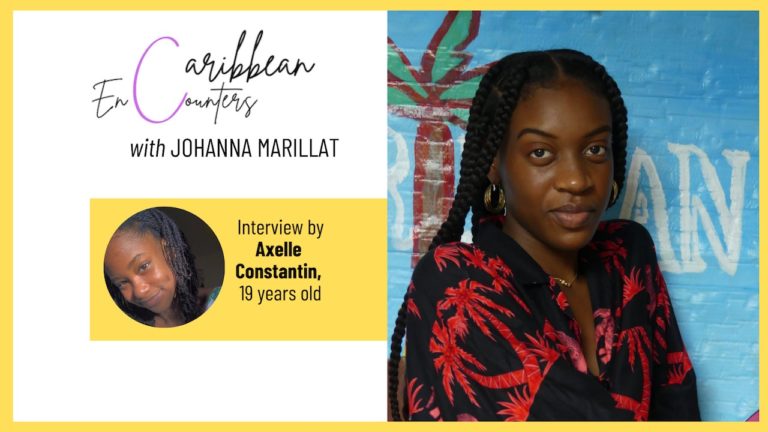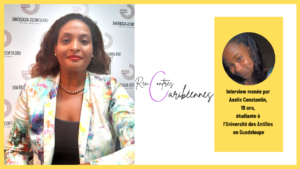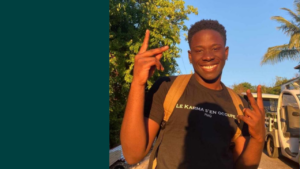In November 2020, I interviewed Sarah Tannous. I was particularly surprised by her personality. She is an enthusiastic, spontaneous woman who expresses herself frankly, yet always with a hint of humour. I knew although she was apprehensive about her English language skills, we would have a lot to talk about.
I was not mistaken. Besides all the qualities mentioned above, she is a very talkative woman.
Sarah Tannous, is in charge of rural animation for the Nord Grande-Terre Agglomeration Community, Vice-President of CORECA, an association whose purpose is to develop inter-Caribbean exchanges. She is also an interpreter for The Greatness Academy, her own life coaching company, and translates every now and then the coaches working at the Greatness Academy.
In six questions and a few dozen minutes, we discussed her professional career, she explained to me how she learned Spanish, which she speaks fluently, and also how she is using the restraints of today’s health crisis advantageously.
- Can you give us some insights into your position as a rural development officer? What does it involve?
This job is one of my main activities at the moment. I joined this position at the beginning of this year. Overall, I help companies from the Nord Grande-Terre region to access to European funds, and we are helping them for the creation and development of their activities.
I also participate in setting up and structuring projects such as the creation of a business in the area of Vermont which is located in the city of Petit-Canal. It is also about the development of the main ports of the territories in the Nord Grande-Terre region, many cities are bordered by the sea, and consequently we have loads of port infrastructures to develop. Finally, one of our main projects is the creation of a craft village at Anse du Souffleur in Port-Louis.
What I really appreciate about my job is the diversity and the topics we are dealing with. I work daily with different kinds of industries and my main mission is to contribute to the economic development of this part of the island.
- On this subject, what solutions have you considered to overcome the pandemic?
When the pandemic occurred, the main purpose to us was to be able to help the companies. We set up a support platform for all the economic operators to give them access to regional and national subsidies, and we actually realised that in our territory, there are many difficulties for the small businesses to access to onlines processes and procedures.
During this period, I became aware of the amount of people being digitally illiterate here. In the region, numerous people are working alone. The main companies are small businesses, and particularly auto-entrepreneurs who do not necessarily have employees. and usually, they are very competent in their fields, but they lack abilities when it comes to administration or accounting, basically concerning what they need to have a sustainable company.
Our platform has been working with three consultants every day from Monday to Saturday. we were helping them on the phone, or we could also welcome them directly at the office, to enable them to fill all the documents and procedures online and then receive funds and subsidies from Guadeloupe’s regional council, and also from the State (national funds help).
However, besides the pandemic, in any case of difficulties, to me the restrictions we had seemed to be an invitation to discover new opportunities, new ways of working, developing your plans, using social networks, create relationships, even in your private, personal life, this time was for me a real opportunity to think different.
- You are also the vice-president of the CORECA association, can you describe the journey you have made to reach this position?
It was a perfect timing for me. When I finished my studies in 2001, I went to Mexico to work there, and when I came back to Guadeloupe I continued working in the beauty and cosmetic industry for 10 years. I stopped this job in 2006 because it was the perfect timing for me to take a year to do whatever I wanted and I realised that since I was a kid, my parents offered me the opportunity to travel in the Caribbean. I went to Barbados, Cuba, the Dominican Republic to learn English.
I joined the CORECA in 2016 as an active member. I had been following them for many years. I liked the kind of work the association was doing but I didn’t have the time to get involved into it. So when I stopped working, I took a sabbatical year, and I only had two main interests: the CORECA and my son, and I decided to get focused on the Caribbean cooperation through the CORECA.
After a few months I was a part of the committee and I was elected as Vice President. At this time I had been given several missions such as: leading a cultural delegation of 22 artists for the Karifesta 2018 (which was a very exciting project), guiding two experts during the agrotourism fare in the Dominican Republic the same year. Knowing a little bit of English and being fluent in Spanish was a significant benefit for the association and in my opinion this is one of the reasons the gave me this position.
- You come from Guadeloupe, a Creole and French-speaking archipelago, what inspired you to become a Spanish-speaking coach interpreter for The Greatness Academy?
The Greatness Academy is my own company. I created I at the beginning of 2019. In my career, I have been living in Mexico and for the 1st time in 2018, I have experienced the power of a kind of life coaching that helps you realise how powerful you can be if you understand that you are the source of everything in your life, you make things differently. I have been lucky to attend one of those trainings in Santo Domingo in 2018 and I realised how powerful this method was. It is also referred as “transformation”. When I started as a participant to know more about this kind of training, I noticed that it was a very efficient tool to help people reach their goals and to catch their dreams.
And one day, one of my associates invited me to create The Greatness Academy in Paris. We didn’t have any french-speaking coach. We had to contact a Puerto Rican coach, and then we had someone to translate the training. When I arrived, I listened to the guy speaking and to me it was obvious that the guy wasn’t helping the coach to catch the audience’s attention because he wasn’t a professional interpreter. He knew how to speak french but it is not only a matter of speaking the language, you have to be able to speak with the same energy, to connect with people as well. In the field of personal development it is very important to connect with people and to what you are saying. So I talked to the person in charge of the event to tell him that it is not working. And the coach told me : “ if you see that something is not working and you know how to do it, do it.” I am from a culture where you only are a professional when you have studied for what you are practicing. But I understood that I had the skills, and that if I know how to use them, I don’t have to wait for the diploma or to make a specific career in something to be able to do it. And that’s how for the first time of my life, i translated live. Two minutes after, the audience was laughing, everybody was in.
And the coach told me to stay for three more days . I was scared at the beginning. But I realised that my skills were enough to translate and my first experience as well as my last one was a success. Someone came to me and asked me where did I study translations because I was doing so well. I was amazed and I perceived that when you have the intention of doing something and you put all your self confidence, love and devotion in what you are doing, you give yourself a hundred percent, it can only be a success.
After that, the coach recommended me to all the Spanish coaches and I have been translating conferences and trainings for 6 months in Paris and Bruxelles. Then I decided to start my own experience in Guadeloupe, contacting coaches to make trainings here, translating and interpreting them also.
- Since you have lived in several Caribbean territories, have you experienced any difficulties yourself due to language barriers?
Actually, I cannot say that. I was one of the worst students when in came to English and Spanish classes in school. I was so bad in language classes that my teachers used to say : “if TANNOUS can understand this, anybody can”. And when I traveled to Cuba, I couldn’t understand the people but they had so much to tell me about the revolution, the lifestyle, their way of thinking… I was 14 years old and I was very frustrated. And when I came back, I decided to learn Spanish to be able to discover Cuba for real. And it started by listening to Spanish musics. So I never really had issues concerning the language even if I wasn’t perfectly bilingual, the most important thing for me is : daring to speak out ! No matter how many mistakes you do, if you think you’re incorrect, or you don’t have the vocabulary.
If you really want to communicate with people, you can do so. I was never ashamed of not speaking perfectly an other language.
- How has the global health crisis helped you to strengthen the links between the different territories of the Caribbean, through your different professional activities?
Concerning my activities at the Nord Grande Terre cooperation, we didn’t have a really impact because we are not working directly with the Caribbean. But regarding my activities at the CORECA, digital communication has been an efficient tool to fill the gap between the Caribbean islands especially when it comes to sharing experiences.for instance, it was the first time for us, knowing that we are not being focused on social networks, to meet remotely. And we were able to reach a wider audience than when we were meeting in person at the head office.
We had the Creole month in October, and we organised a huge meeting with creole speaking people from Haiti, the Dominican Republic, French Guyana, the Reunion Island, Saint Lucia, Trinidad and Tobago, and it was the first time we were able to share all this knowledge without all the cost that wouldn’t have allowed us to organise it. It was also the same with the sustainable development movement the OECS organised in October too. We have been able to participate virtually with the collaboration of the region council of Guadeloupe and if it wasn’t for this situation we wouldn’t have been able to fill those gaps between the different communities. So it was very positive generally speaking.

